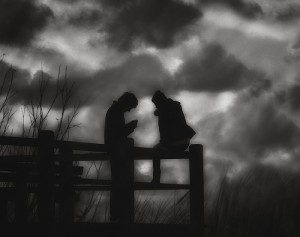A survey performed in 1993 shows that 20 percent of women and five to 10 percent of men in the United States have been victims of childhood sexual abuse. For those who are not acquainted with the ugly side effects of childhood sexual abuse, the outcome is devastating.
But what does this look like from a Mormon perspective?
Statistics will say that the odds of the offender being a family member or friend is very high – 70 to 90 percent possible, in fact. How does this affect the forgiveness process, a huge staple among LDS beliefs.
As someone with a lot of experience in this area, and a life-time Mormon, the only thing I can say about this process is that it’s extremely difficult, and by some can be misinterpreted. Forgiving someone does not mean you have to be friends with the offender afterwards and sit down for lunch. You don’t have to enjoy being in their presence or think they’re a wonderful person. Forgiving this person means realizing they will pay for their sins at the judgement seat, and moving on with your life without begrudgement.
Of course, this is always easier said than done. There can be heavy burdens placed upon the victims. Sexual abuse is a unique crime in the fact that the victim is continually victimized. I’ve even heard members say some girls were asking for it because they were immodestly dressed, or weren’t as active as they should have been because they haven’t been coming to Young Women’s activities.
A young woman I knew who was a victim of severe sexual abuse hated going to Young Women activities or being around her leaders, because they would constantly ask her, “Are you morally clean?”
First, let me say that I know these women have their hearts in the right place. They are concerned about the virtue of their young women. In Jacob 2:28 it says, “For I, the Lord God, delight in the chastity of women.”
I suppose the question among some members is whether victims of sexual abuse are “morally clean.”
There is no doubt in my mind that these victims are special children of God, and they are just as morally clean as they would have been without the abuse. Because their free agency was taken away, I don’t see how a victim of this horrible crime would ever be held accountable for it.
Especially when the abuser is a member of the church, it is understandable how these victims could possibly go inactive. Someone once asked me the question, “How can I belong to a church that has members that sexually abuse little children?”
First, my response is that she would be hard-pressed to find a single religious organization or sect in the world that did not have that within it. Secondly, it is important to remember the, what I call, Mormon mantra, “The church is perfect, the people are not.” Third, I explained that during this time of life, it is important to turn to our Heavenly Father.
By doing this, I believe these victims can achieve inner peace. In Elder Paul V. Johnson’s talk, “Where Can I Turn For Peace?” he talks about two kinds of peace. First, inner peace, which is peace with one’s self, peace of mind, peace of soul. Second is peace in the world.
Although the victim may be going through an extremely heavy burden, inner peace can still be obtained. President Howard. W. Hunter said,”The gift of peace doesn’t mean all our problems and challenges will dissolve according to a timeline we set. But we can have peace amidst trials.”
I have heard the analogy of a tornado storm used to describe trials and finding faith. If you are in a cellar, safe but still within the storm, why would you wander outside your shelter into the heart of the turmoil outside? The same logic can be used with becoming inactive because of a trial. Why would you walk out of the shelter of the gospel to seek peace in a blizzard of worldly danger?
Again, easier said than done. Though these victims have been through some of the hardest trials, hopefully they can find inner peace by turning to the man who can comfort them most – our Heavenly Father.
For more about healing from abuse, here are some conference talks to refer to.
Protect the Children by Elder Dallin H. Oaks. The Tongue of Angels by Elder Jeffrey R. Holland. Save The Children by President Gordon B. Hinckley. Healing the Tragic Scars of Abuse by Elder Richard G. Scott.


Just as with any authority structure (i.e parent-child), some may use the church as a vehicle to carry out sexual abuse (i.e. leader-on-youth). The presence of an organization is not the cause of the fault, but the policies and practices can either help or hurt the cause: two leaders present for activities, bishops notifying legal authority when there’s any accusation, and not blaming young women’s clothing. This last issue, modesty, is too often propped up as a tool which young women are expected to use to control their own thoughts and those of young men. We teach modesty as if it were an ultimate barrier, and that if this defense is dropped, then the young woman is partially to blame for the outcome. Young women should never be made to feel that they will be blamed if they become a victim of sexual assault, and no one, especially young men, should be allowed to consider a young woman’s lack of perfect modesty as an excuse for sexual abuse.
Thank you for your comment – very informative!